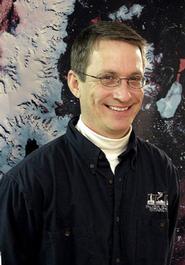
Domack organized and Hamilton College recently hosted a conference, Antarctic Peninsula Climate Variability: A Historical and Paleoenvironmental Perspective. The goal of the conference was to develop an understanding of the forcing mechanisms behind the significant environmental changes taking place in the Antarctic Peninsula region, such as decay of ice shelves, decrease in sea ice cover and an increase in mean annual summer and winter temperatures. The National Science Foundation Office of Polar Program, the Hamilton College Environmental Studies Program and Colgate University sponsored the conference.
Domack has 23 years of Antarctic experience and has spent the last 14 in the Peninsula region. His interests lie in understanding the natural record of environmental variability locked in glacial marine sediments in fjords and inner coastal basins on both sides of the Peninsula. He currently is on the Distinguished Speaker List of the Ocean Drilling Program, serves on the Antarctic Research Vessel Oversight Committee, and is currently investigating the paleorecord of Antarctica's disintegrating ice shelves. Domack is a member of the Sedimentary Research Society, American Geophysical Union, International Glaciological Society, and the American Quaternary Association.
Posted September 5, 2002
